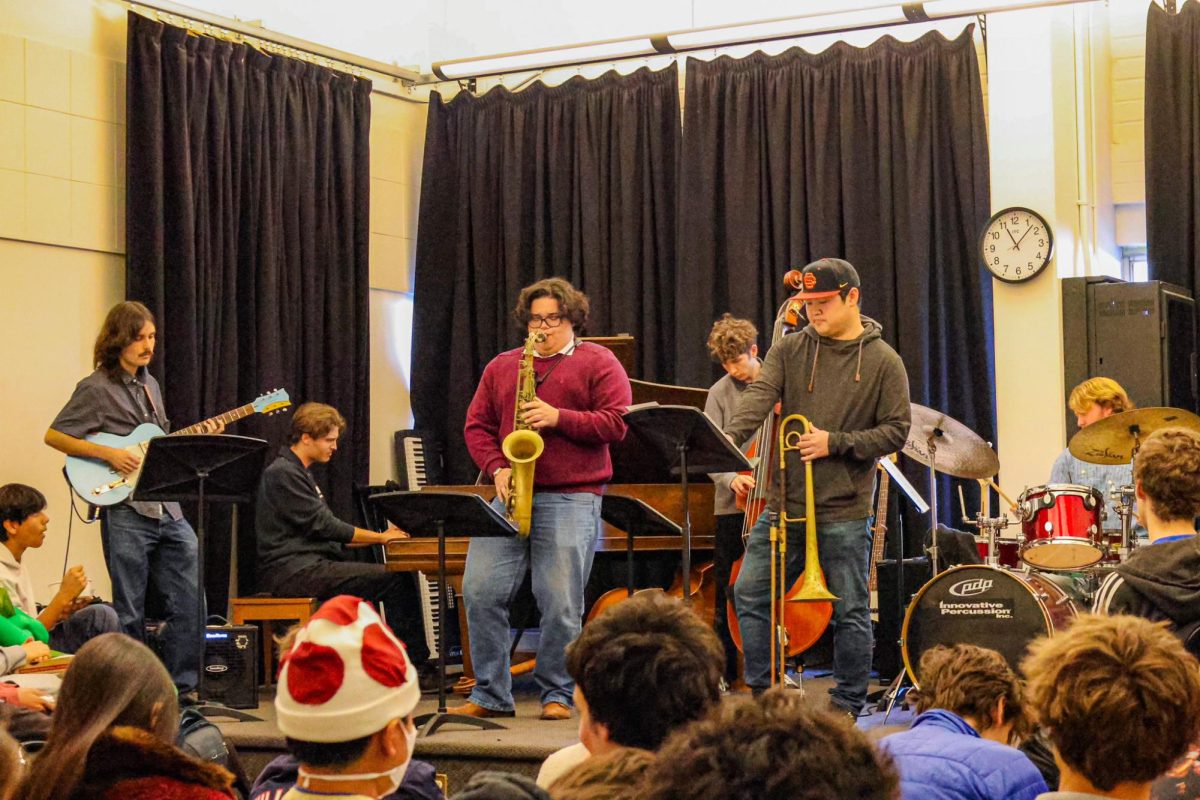Upper school orchestra and choir students collaboratively hosted two concerts Feb. 9 and 10 at the Emmanuel Lutheran Church and Feldman Horn Gallery.
The first concert included a variety of performances, including pieces by solo instrumentalists and chamber groups. Additionally, students participated in larger choir group pieces, Symphony and Camerata Strings.
The second concert was dedicated to chamber music without the use of a piano. It included group performances, varying in size from a duet by Joseph Lauber to a septet by Adolphe Blanc.
“I really love all the music because I chose everything for certain students,” performing arts teacher Mark Hilt said.
“Some students came to me with suggestions, so it was a real collaborative process. I have to consider each student’s potential as a player, and what they are capable of. If I give them a challenge, I consider how far they can grow in it. It is really about choosing music that is appropriate for the students who are going to perform.”
One of the challenges assigned, according to Hilt, was “Quartet for the End of Time,” a piece written in 1945 by Olivier Messiaen, a French composer who was a prisoner of war in a Polish camp. Hilt assigned three movements: “Abyss of the Birds,” performed by Jenny Yoon ’19, “Intermezzo,” performed by Megan Chang ’19, Yoon and Ori Zur ’18, and “Praise to the Immortality of Jesus,” performed by Hilt and Clara Ross ’19.
“It is a major milestone of the 20th century of this century of music,” Hilt said. “To be able to give high school students that challenge of playing that music and introducing it to them for the first time is a big deal. It is difficult. It is good to give challenges like that.”
As for the choral program, all three of the selections that they are singing are selections that they will perform on their trip to Canada next week.
“This gives us an opportunity to perform some of our most challenging and most inspirational pieces in public before we actually take it on the road,” performing arts teacher Zanaida Robles said. “I thought it was a very good opportunity to put that repertoire out there for our audience.”
To prepare for the concert and the trip to Canada, choir students have been rehearsing during class, after school and on some Saturdays.
“Practice, practice, practice,” Robles said. “Students work really hard in sectionals, during free periods and whenever they can they get together so they can memorize their music on their own. They submit reports about what they have worked on in their sectionals on their own just to make sure that everybody is on it.”
Orchestra students had a different practice regiment. Hilt had to split up students into small groups and organize a schedule since several students were in multiple chamber groups.
“It is a real challenge,” Hilt said. “I make the rounds first period. It is a balancing act all the time. I’ve given students some real challenges and everything I’ve heard sounds terrific.”
In addition to the rehearsals in class, many of the chamber groups use their free periods to get together to practice their pieces.
Despite all of the hard work dedicated to music, Robles believes that the music classes at the Upper School allow students to have a place to escape.
“I try to create an environment that’s non-competitive and gives [the students] a chance to blow off steam so that this class becomes an environment where they can escape the other stresses,” Robles said. “This is a different kind of focus. I think the students appreciate the opportunity to make music together in an environment that gives them the power of expression.”
Hilt said music is beneficial not only for students but for everyone.
“[Music] really connects us with who we are as human beings,” Hilt said. “You are in touch with something that is bigger than yourself and your cares. By connecting us to the music, we also connect to the people who listen to the music in some unseen way. I think music is not just important for students, but for everybody. It is crucial to who we are as human beings.”


































